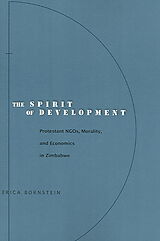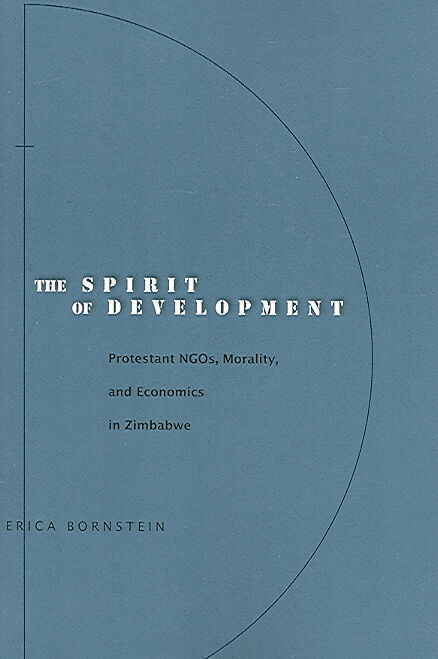The Spirit of Development
Einband:
Kartonierter Einband
EAN:
9780804753364
Untertitel:
Protestant Ngos, Morality, and Economics in Zimbabwe
Genre:
Politikwissenschaft
Autor:
Erica Bornstein
Herausgeber:
Stanford University Press
Anzahl Seiten:
227
Erscheinungsdatum:
08.08.2005
ISBN:
978-0-8047-5336-4
Zusatztext " The Spirit of Development ...provides exemplary insight into the debates and practices amongst NGO staff in Harare and the United States concerning the intersection of faith and development! providing much-needed analysis on the intertwining of religious and economic assumptions and their (mis)translations within transnational organizations such as NGOs and those they endeavor to spiritually and materially transform." Informationen zum Autor Erica Bornstein is Assistant Professor in the Department of Anthropology, University of Wisconsin-Milwaukee. Klappentext Religious NGOs are important sources of humanitarian aid in Africa, entering where the welfare programs of weakened states fail to provide basic services. As collaborators and critics of African states, religious NGOs occupy an important structural and ideological position. They also, however, illustrate a key irony--how economic development, a symbol of science, progress, and this-worldly material improvement, borrows heavily from other-worldly faith. Through a study of two transnational NGOs in Zimbabwe, this book offers a nuanced depiction of development as both liberatory and limiting. Humanitarian effort is not a hopeless task, but behind the liberatory potential of Christian development lurks the sad irony that change can bring its own disappointments. While rapt attention has been given to the supposed role of NGOs in democratizing Africa, few studies engage with the ground operations. Questioning the assumption that economic development is a move away from religious mysticism toward the scientific promise of progress, the author offers a remarkable account of development that is neither defeatist nor comforting. Zusammenfassung Religious NGOs are important sources of humanitarian aid in Africa, entering where the welfare programs of weakened states fail to provide basic services. As collaborators and critics of African states, religious NGOs occupy an important structural and ideological position. They also, however, illustrate a key ironyhow economic development, a symbol of science, progress, and this-worldly material improvement, borrows heavily from other-worldly faith. Through a study of two transnational NGOs in Zimbabwe, this book offers a nuanced depiction of development as both liberatory and limiting. Humanitarian effort is not a hopeless task, but behind the liberatory potential of Christian development lurks the sad irony that change can bring its own disappointments.While rapt attention has been given to the supposed role of NGOs in democratizing Africa, few studies engage with the ground operations. Questioning the assumption that economic development is a move away from religious mysticism toward the scientific promise of progress, the author offers a remarkable account of development that is neither defeatist nor comforting....
"The Spirit of Development...provides exemplary insight into the debates and practices amongst NGO staff in Harare and the United States concerning the intersection of faith and development, providing much-needed analysis on the intertwining of religious and economic assumptions and their (mis)translations within transnational organizations such as NGOs and those they endeavor to spiritually and materially transform."
Autorentext
Erica Bornstein is Assistant Professor in the Department of Anthropology, University of Wisconsin-Milwaukee.
Klappentext
Religious NGOs are important sources of humanitarian aid in Africa, entering where the welfare programs of weakened states fail to provide basic services. As collaborators and critics of African states, religious NGOs occupy an important structural and ideological position. They also, however, illustrate a key irony--how economic development, a symbol of science, progress, and this-worldly material improvement, borrows heavily from other-worldly faith.
Through a study of two transnational NGOs in Zimbabwe, this book offers a nuanced depiction of development as both liberatory and limiting. Humanitarian effort is not a hopeless task, but behind the liberatory potential of Christian development lurks the sad irony that change can bring its own disappointments.
While rapt attention has been given to the supposed role of NGOs in democratizing Africa, few studies engage with the ground operations. Questioning the assumption that economic development is a move away from religious mysticism toward the scientific promise of progress, the author offers a remarkable account of development that is neither defeatist nor comforting.

Leider konnten wir für diesen Artikel keine Preise ermitteln ...
billigbuch.ch sucht jetzt für Sie die besten Angebote ...
Die aktuellen Verkaufspreise von 6 Onlineshops werden in Realtime abgefragt.
Sie können das gewünschte Produkt anschliessend direkt beim Anbieter Ihrer Wahl bestellen.
Loading...
Die aktuellen Verkaufspreise von 6 Onlineshops werden in Realtime abgefragt.
Sie können das gewünschte Produkt anschliessend direkt beim Anbieter Ihrer Wahl bestellen.
| # | Onlineshop | Preis CHF | Versand CHF | Total CHF | ||
|---|---|---|---|---|---|---|
| 1 | Seller | 0.00 | 0.00 | 0.00 |
